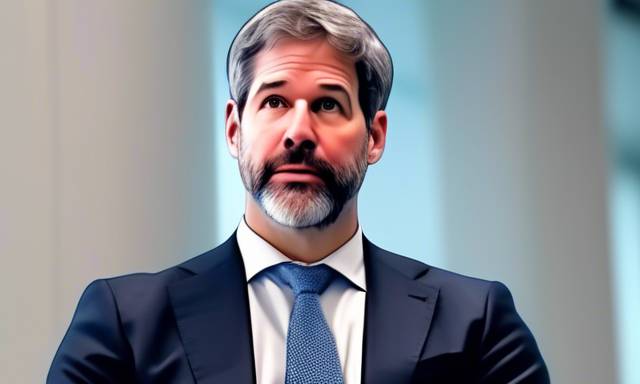Analyzing the Impact of Political Dynamics on Cryptocurrency 🌍
This year brings significant discussions in the cryptocurrency sector, particularly centered around the upcoming presidential race between Donald Trump and Kamala Harris. Despite these political developments, BlackRock’s CEO, Larry Fink, views them as largely irrelevant to the future performance of Bitcoin.
Fink’s Perspective on Bitcoin’s Resilience 💼
During BlackRock’s Q3 earnings call on October 15, Fink communicated that the outcome of the 2024 U.S. presidential election is unlikely to influence Bitcoin’s long-term prospects. He expressed skepticism about whether either the current President or any opposing candidate would create a meaningful impact on Bitcoin’s value.
According to Fink, Bitcoin stands as a distinctive asset class that can operate independently of political fluctuations. This sentiment underscores the idea that Bitcoin’s evolution is more about factors such as liquidity and transparency rather than just regulatory changes.
Fink elaborated on his viewpoint by stating, “If we create more accessibility, more transparency, more analytics related to these assets, then it will expand.” This displays a belief that the adoption of digital assets will continue to gain traction globally, irrespective of different governance structures.
His assertion implies that the increasing interest and acceptance of cryptocurrency are driven by fundamental market principles rather than simply the stance of political figures.
Trump’s Position on Cryptocurrency ⚖️
Amidst this climate, former President Trump is currently perceived as the leading candidate on Polymarket, holding a notable 16% advantage. He is often considered a more favorable figure within the crypto sector due to his inclination towards fostering innovation. Should he regain the presidency, proponents expect potential supportive moves towards the cryptocurrency ecosystem.
Recently, Trump has made strides by aligning himself with a DeFi initiative, World Liberty Financial, which signals an intent to intertwine his political ambitions with the burgeoning cryptocurrency landscape.
In contrast, Vice President Kamala Harris has proposed establishing clearer regulations around digital assets. This proactive approach demonstrates a growing bipartisan acknowledgment of the importance of cryptocurrencies.
Nevertheless, Fink’s commentary raises questions about whether such political efforts would yield substantial outcomes for the cryptocurrency industry.
The Continued Relevance of Regulation ⚖️
Although Fink downplays the importance of political outcomes, he recognizes that regulation still plays a crucial role in shaping the cryptocurrency environment, especially in the United States. U.S. Securities and Exchange Commission (SEC) Commissioner Mark Uyeda has voiced concerns regarding the current regulatory ambiguity, highlighting the need for clearer guidelines.
This frustration is echoed across the cryptocurrency community, where the SEC faces rising scrutiny for its so-called “regulation-by-enforcement” approach. Critics point to the agency’s tendency to initiate legal actions against significant industry players rather than developing well-defined regulatory frameworks.
In recent developments, various states have come together, spearheaded by Iowa Attorney General Brenna Bird, to file an amicus brief challenging the SEC’s attempts to regulate the cryptocurrency sector. They argue that these measures amount to an overreach of power that could inhibit innovation and exceed the agency’s jurisdiction.
This coalition contends that the existing regulatory space is not only unclear but also excessively punitive, acting as a barrier to the growth of the cryptocurrency sector.
Hot Take: Navigating the Political Landscape and Crypto’s Future 📈
Looking ahead, the intersection of politics and cryptocurrency presents a complex narrative for stakeholders. While the political landscape evolves with candidates like Trump and Harris taking differing stances on digital assets, the foundational aspects that drive Bitcoin and other cryptocurrencies may remain largely unchanged.
This year emphasizes the necessity for liquidity, transparency, and a more supportive regulatory framework as critical components for the future of cryptocurrency. As the industry navigates these political shifts, industry participants must remain observant and adaptable to both regulatory developments and market dynamics. In doing so, they can better position themselves for what lies ahead in this rapidly evolving landscape.





 By
By
 By
By
 By
By

 By
By
 By
By